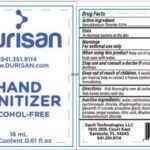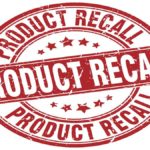Durisan is expanding their recall of an antimicrobial hand sanitizer for possible Burkholderia contaminas contamination. The previous recall was for possible Burkholderia cepacia complex and Ralstonia pickettii contamination. The recall now includes products that have not yet expired. This issue was again discovered during a routine audit. No reports of adverse reactions or consumer complaints have been reported to the company to date. The product is applied topically to help reduce bacteria on the skin when soap and water aren't available. Use of hand sanitizer contaminated with Burkholderia contaminans, a pathogen of low virulence, can range from no reaction to a possible infection in a person with a hand wound or scrapes. People with compromised immune systems are most at … [Read more...]
Maison Terre Goldenseal Root Powder Recalled; One Infant Has Died
Maison Terre of Little Rock, Arkansas is recalling all lots of Maison Terre Goldenseal Root Powder for bacterial contamination. FDA laboratory analysis of product samples found the product is contaminated with Enterobacter cloacae, Cronobacter sakazakii, and Cronobacter dublinensis, among others. This product was purchased from Starwest Botanicals of Sacramento, California, and repackaged to sell to consumers. The recall notice states, "The use of contaminated product in otherwise healthy patients can result in infections necessitating antimicrobial and potentially surgical treatment. In individuals with weak immune systems and infants, the use of the product can result in death. Maison Terre has received a report of one infant death associated with use of this product on the … [Read more...]
High Salt Diets May Make You More Susceptible to Food Poisoning
A new study conducted at the University of Bonn in Berlin has fond that eating too much salt weakens the immune system, which may make people more susceptible to foodborne illness. Of course, it makes you more vulnerable to all other bacterial infections as well. And a high sodium diet causes hypertension, a risk factor for heart attacks and strokes. In the study, mice who where fed a high salt diet suffered from "much more severe" bacterial infections. Human volunteers were then fed an additional six grams of salt per day. They also showed "pronounced immune deficiencies." The amount of extra salt they were given is the salt content of two fast food meals. The study says that people should eat five grams of salt a day, no more. That is the maximum daily amount recommended by … [Read more...]
Some Abbott Liquid Diet Products Recalled in Canada for Possible Bacterial Contamination
One illness has been reported associated with some Abbott Two Cal brand and Abbott Promote brand formulated liquid diet products in Canada. Those products are now subject to a recall. The products were sold nationwide at the retail level. This recall was triggered by consumer complaints. One illness has been reported to public health officials. The recall notice did not state what strain of bacteria may be in those products, and also did not state if any testing of the products has revealed the possible pathogen. The recalled products include Abbott Promote High-Protein Liquid Nutrition - Vanilla Flavor in 235 ml bottles. The code on the product is L84417RA0 xxxx (xxxx=time code) 2019JA1 and the UPC number is 0 55325 20170 0. Also recalled is Abbott Two Cal HN Complete, Balanced … [Read more...]
Researchers Develop Patch called “Sentinel Wrap” to Detect E. coli and Salmonella Bacteria
Researchers at McMaster University in Canada have developed a transparent test patch called "Sentinel Wrap" that can be incorporated into food packaging to monitor for pathogens such as Salmonella and E. coli. The patch, which is printed with harmless molecules that can detect food pathogens, would trigger a signal if it detects bacteria that could be read by a smartphone. The patch doesn't affect the food. The new material was developed in biochemist Hingfu Li's labs at McMaster. Chemical engineer Carlos Filipe and mechanical-biomedical engineer Tohid Didar collaborated on the project. The researchers say that the patch can be incorporated into the production process by food manufacturers. The patch contains tiny drops of DNA sensors that will light up when it finds a pathogen. … [Read more...]
Newswanger Meats Recalls Meat for Possible Bacterial Contamination
According to news reports, Newswanger Meats is voluntarily recalling more than one ton of beef, pork, chicken, sausages, and deli meat because they may have come into contact with coliform bacteria. Coliform bacteria are found in feces and are an indicator that other pathogenic bacteria such as E. coli may be present. More than 2,000 meats are being recalled. No illnesses have been reported public health officials or to the company to date in connection with this issue. The company said the meat was produced with water that did not meet Ohio Department of Health requirements and tested positive for coliform bacteria. This type of bacteria can cause GI upset and symptoms such as abdominal cramps, fever, and diarrhea. The water did not test positive for E. coli. The recalled meats … [Read more...]
Class I Recall Issued for Ready-To-Eat Chicken Products
Wayne Farms, LLC, headquartered in Decatur, Alabama, has announced a recall of its ready-to-eat chicken products, according to the United States Department of Agriculture (USDA)’s Food Safety and Inspection Service (FSIS). After a consumer alerted the company that the chicken appeared to be undercooked, Wayne Farms ascertained that approximately 12,610 pounds of the chicken was inappropriately processed. As a result, dangerous bacterial pathogens may still be in the food. This is a Class I, “High Health Hazard” recall. This means that consuming the product may result in serious injury or death. The recalled products were ready-to-eat breaded chicken bites, packaged on December 1, 13, and 30, 2016, and distributed in boxes of two clear plastic 5-pound bags. These were labelled as … [Read more...]
University of MN Identifies New Strain of Antibiotic Resistant Bacteria
Dr. Tim Johnson of the University of Minnesota has identified a new strain of antibiotic resistant bacteria. This bacteria, known as Enterobacter cloacae, was reported in a hospital outbreak in Fargo, North Dakota. Whole genome sequencing revealed that 32 of the strains collected from patients in the Upper Midwest were clonal. The bacteria is spreading throughout this region of the country. Dr. Johnson said, "this provides evidence for the origin of this multidrug resistant clone in the Fargo-Moorhead area, followed by its spread over time through nursing homes and hospitals in western Minnesota, and more recently in the Twin Cities metro area." He added, "this is a public health crisis. This is probably the biggest challenge we're going to face from a public health standpoint in our … [Read more...]
Reusable Plastic Containers Still Harbor Bacteria After Cleaning
A new study conducted at the University of Markansas at Fayetteville has found that Salmonella and other foodborne pathogens attach to reusable plastic containers used in industry and remain even after cleaning. Those pesky biofilms are, again, the culprit. Scientists looked at the materials used to make these food containers that are used to transport fruits and vegetables to grocery stores. In the study, researchers let Listeria monocytogenes, Salmonella, and E. coli O157:H7 bacteria to grow on the reusable plastic container (RPC) surface and then cleaned and sanitized the containers according to industry standards. In all cases, the material still had biofilms that protected the bacteria even after cleaning. Biofilm is a kind of slime made of protein that surround the bacteria, … [Read more...]
Stonyfield Recalls Yogurt for Coliform Bacteria
Stonyfield is recalling 188 6-packs of YoBaby Peach/Pear Cups because they may be contaminated with coliform bacteria called Klebsiella pneumoniae. Coliform bacteria are an indication of insanitary water and possible fecal contamination. The yogurt cups were sold in Target and Walmart stores. The recalled product is 4 ounce YoBaby Peach/Pear cups with the code date June 5, 2014 and UPC number 052159701161. They were shipped to Target stores in Alabama, Virginia, Tennessee, Florida, Georgia, North Carolina and South Carolina; and to Walmart stores in Pennsylvania, Maryland, New Jersey and Delaware. The recalled products were only available for purchase on or after April 23, 2014. Internal testing by the company discovered the problem. Stonyfield's distribution network has been … [Read more...]














